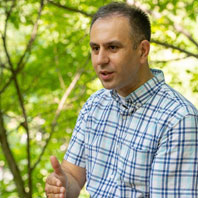
Edison Research pre-election survey results
By Anastasia Sokhadze
Friday, July 24
The survey was conducted from June 23rd to July 13th, using a face-to-face survey method. The study surveyed 2,000 people aged 18 and over living in Georgia (excluding the occupied territories).
According to the results of the public poll of ‘Edison Research,’ the Chairman of European Georgia is the leader among the probable candidates for the Prime Minister from the opposition.
Citizens answer the question about who they think should be the prime ministerial candidate of the opposition coalition in case of victory. David Bakradze is the leader with 26% of the voting, Giorgi Vashadze follows with 20% of the voting, Grigol Vashadze – with 18%, Mikheil Saakashvili – with 7%, Nika Melia – 5%, Shalva Natelashvili – 4%, Irma Inashvili – 2, and Mamuka Khazaradze – with 2%.
In addition to party ratings, the Edison Research survey focused on the majoritarian constituencies in Tbilisi where the opposition has nominated common candidates. Opposition parties gathered at the Labor Party office to nominate candidates in six of Tbilisi's eight constituencies (excluding Saburtalo and Didube-Chugureti).
Elene Khoshtaria, a mayoral candidate in Tbilisi for the Movement for Liberty - European Georgia, has the best rate out of 6 districts of Tbilisi with 46% of the voting.
The citizens also answered the question: if the elections were held today, who would you vote for? Georgian dream got 39% of votes, the United National Movement – 16%, European Georgia is supported by 5% of the voting, and 20% of respondents have not yet made a decision. These results show that the Georgian Dream will not be able to form a government on their own. Per the constitutional amendments passed earlier this month, an election bloc or party which receives less than 40.54% of votes in the proportional elections will not be able to form a government. The ruling Georgian Dream party says that they do not trust in the polls commissioned by opposition channels.
“Much has been written about the July results of the Edison Research study although a comparative analysis between the data from these waves is not publicly available. We have tried to do a little analysis based on public information,” stated Giorgi Abramishvili, a member of the party reformer, analyst and marketer.
The data of the first two waves were published in the media, both as natural and as a result of allocation data. In other words, the interested public had the opportunity to easily see the share of voters who at the time of the poll had not decided who to vote for in the 2020 parliamentary elections.
Clearly, it is impossible to predict with 100% accuracy how a voter will behave on the election day. Thus, allocation is fully justified. However, it is interesting why the media ‘grabbed’ the results of the allocation on the first and second waves, but did not emphasize the same in the case of the July results.
At first glance, it is noticeable that the rating of the Georgian Dream has increased significantly in the last 6 months, especially after the March data, and the number of ‘undecided’ voters decreased to 20% according to the July results. The ratings of the main rivals of the ruling party, the National Movement and European Georgia also decreased slightly. It’s possible to come to the logical conclusion that a part of the ‘undecided’ voters, almost a third, decided to vote for the Georgian Dream. What could’ve caused this? COVID-19. Georgia managed to keep the rate of infected and deceased at a very low level. As a ‘green zone,’ which, obviously, had a logical reflection in the citizens, the activities of the opposition parties were excluded during the quarantine and curfew hours, the meeting with the voters, and the media was completely covered with information related to the coronavirus. As a result, the balance of power, as well as the ratio of communication between the government and the opposition, has changed dramatically in favor of the ruling party.
The above conclusion is supported by another fact. On July 20th, the presentation of the majoritarian candidates of the Georgian Dream was held, which was attended by Tengiz Tsertsvadze, Amiran Gamkrelidze, Levan Ratiani, Paata Imnadze - now well-respected people who have made a great contribution to the fight against coronavirus in Georgia. There were two more people from the medical field in the list of MPs directly - the Minister of Health and Social Affairs of Adjara Zaal Mikeladze as a majoritarian candidate in Kobuleti and Zaza Lominadze as a majoritarian candidate in Kutaisi.
It is also interesting to look at the results of the three waves of pre-election research conducted by Edison Research using the allocation method already. The trend of change is the same, though already more pronounced. The Georgian Dream is supported by almost half of the allotted voters, its closest rival, the National Movement - one-fifth of the electorate.
Despite such results, the representatives of the Georgian Dream still expressed dissatisfaction and an ironic attitude towards the study. They say that the rating of the Georgian Dream is actually higher. At the same time, statements from the media and various officials are increasingly heard about the deterioration of the coronavirus-related situation, which may give rise to suspicions that we can expect another ‘curfew’ and ‘quarantine’ in late August or early September.
Since 2004, as the sole provider of Election Day Polling data to the National Election Pool, Edison has conducted exit polls to project and analyze results for every major presidential primary and general election.

